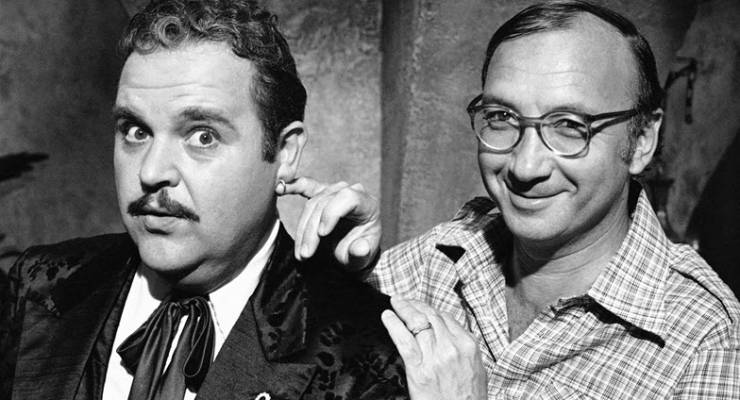
Up in Bendigo a couple of weekends back, I passed the writers festival, and saw on a poster that Jeff Sparrow, former member of the Austudy Five (far-left activists arrested in dawn raids on dodged up pretexts in the Kennett years) was in conversation with former Quadrant editor Robert Manne. “Ah,” I thought “the Sunshine Boys playing the provinces again”.
Call that moment a tiny tribute of sorts to Neil Simon, the playwright who has died aged 91, and whose play of that name has two chalk-and-cheese old stand-up comedians reunited by their children to get them out of the house. That begins with an obituary riff too, as Al and Willie (played by George Burns and Walter Matthau in the movie) discuss the passing of a hack songwriter — “he wrote ‘Lady, Lady, Be My Baby’ — he rhymed “lady” with “baby”, who does that?”. It is probably the acid test of something or other. If you don’t find the idea of a song called ‘Lady, Lady, Be My Baby’ utterly and inexhaustibly funny, you’re not going to like Neil. Also, there’s no hope for you.
From the early 1960s into the mid-1990s, Neil Simon had a play a year, and usually a movie he’d scripted; about two-thirds of them box-office smashes, and actual failures were rare. Born in 1927 to unhappily married parents shellacked by the Depression — “they argued for no reason,” Simon said; if you wanna be a playwright, choose folks who fight for the sake of it — Simon and his brother Danny were selling comedy sketches by the age of 15. After military service, they both got work in TV comedy as part of the legendary writers’ room for Sid Caesar’s TV shows with Woody Allen, Mel Brooks, Lucille Kallen, and Larry Gelbart among others.
Neil’s brother Danny was the comedy guru of the time, but Neil had the drive to turn the quickfire Jewish humour these teams had honed into full-length plays. His first effort Come Blow Your Horn (barely playable today) ran for 700 performances on Broadway. The Odd Couple, his fourth play, was his first classic. It was one of about a dozen still high up in the global repertoire. Of his 20 films (all screenplays; he never directed), 1977’s The Goodbye Girl is the best, with neurotic actor Richard Dreyfuss sharing a disputed apartment with Marsha Mason (Simon’s wife at the time), while he struggles with an off-Broadway director convinced that the secret to doing Shakespeare is that Richard III is gay.
And therein lies one problem with Simon’s claim to posterity; something he worried about and felt a little cheated of. Most recently it is that of changing social morals but even pre-diversity, his comedies had started to creak because many were loaded with the middlebrow think-chatter of the day. Simon lacked the arch skepticism of a writer-artist like Jules Feiffer, or the solving absurdity of Woody Allen, and this, rather than genre disdain has dated him.
Thus, for example, the final act of The Odd Couple runs dead, as Oscar tries to talk Felix out of the repressed tightness making him unhappy, in the cod-Freudian terms of the time. Even a gag-machine set-up like his late play Laughter on the 23rd Floor –– about the Sid Caesar writers’ room, and containing a riff where two hacks have a “name-off”, matching each other with shouted funny names (“Angela Jonesela! Father Abe Brillstein! Rabbi Seamus O’Flaherty!” — has to be rounded out with a human story that we could care less about. More lines, funnyman!
Simon eventually found the respect he yearned for with his “Eugene” memoir trilogy, mild and middlebrow to my ears, save for the middle one, Biloxi Blues, which vividly portrays the growing terror of a group of 18-year-old US army recruits in 1945, as their basic training progresses, and the meat grinder of the Pacific War looms. But what might survive best — aside from the general style of the high sitcom, from MASH through Big Bang, which is “Simonian” throughout — are the comedies he thought of as his purest entertainments. That’s The Sunshine Boys, Last of the Red Hot Lovers — in which the owner of a fish restaurant attempts to join the sexual revolution by borrowing his mother’s apartment for afternoon assignations with, among others, a hippie chick he picks up in the park who lives with a dominatrix “roommate” (“but I sleep waaaaaay over the other side of that big bed from her”) — Barefoot In the Park, the original Sandy Dennis-Jack Lemmon film The Out-of-Towners, and a half-dozen more.
There was a time I could have done a passable one-man version of Red Hot Lovers from memory, having read it to death. All I wanted to be then was that sort of comedy writer; to have been it, even in a mediocre fashion, for a while was a unique joy. Farewell, sunshine boy, into the sunset of the era of a certain way of doing that, where nothing could be funnier than a song called ‘Lady, Lady, Be My Baby’.








My favourite is ‘Laughter on the 23rd Floor’ although The Odd Couple & The Out of Towners run close. The original film of the latter with Lemmon/Dennis was infinitely better than the 1999 remake. Why does Hollywood persist with guaranteed inferior remakes…?
Simon was a great talent. Imagine being a fly on the wall of the 23rd floor…Simon allowed us to be that lucky fly.